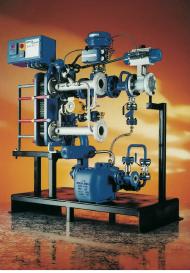Engineered systems reduce energy costs

Replacing five shell-and-tube calorifiers with engineered systems from Spirax Sarco is saving £3000 a year in energy costs at Stafford General Hospital.
Energy savings of more than £3000 a year are being achieved following the replacement of five shell-and-tube calorifiers at Stafford General Hospital with Spirax EasiHeat engineered systems. The work has improved the supply of hot water to the main kitchen, and further savings are expected as more calorifiers are replaced in the future. The hospital has four plant rooms, each originally equipped with two calorifiers for space heating and two for domestic hot water. Technical-services engineer Chris Holt explains, ‘These calorifiers are 20 years old. The heating load has increased as the hospital has expanded, and the calorifiers struggle to keep up with demand.’ The calorifiers also needed to be stripped down for insurance inspection every 14 months, which took 10 hours each. ‘Problems with corrosion were also ongoing, requiring costly maintenance tubes,’ says Mr Holt. Each plantroom now has one EasiHeat for space heating, and a DHW calorifier serving the main kitchen has also been replaced. ‘This particular plant room serves the main kitchen,’ says Mr Holt. ‘Our goal is to install an EasiHeat for DHW in each plant room. While other options were considered, the EasiHeat units were cost effective. Rated up to 1200 kW, EasiHeat units use plate heat exchangers to provide heating and hot water on demand. These compact skid-mounted systems are straightforward to fit into existing plant rooms.
Related links:


